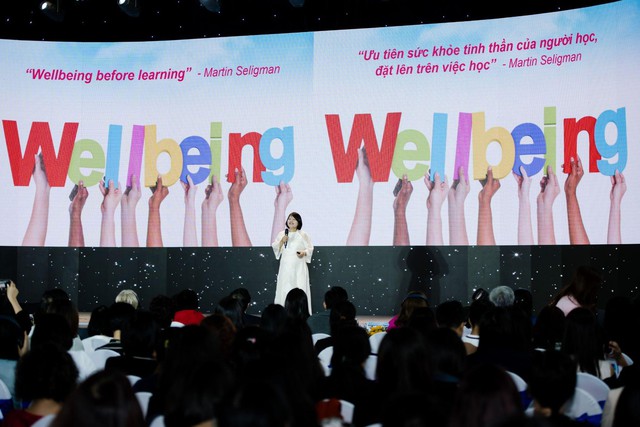The “Happiness in Education” workshop, held on November 23-24 at TH School in Hanoi, witnessed engaging discussions among international education experts, hundreds of teachers, and parents regarding this trending educational approach.
Happiness Education: A Global Trend
The “Happy School” initiative, first launched by UNESCO in 2014, aims to promote student happiness and holistic development worldwide. This initiative stems from the belief that quality education and happiness in schools are inseparable, and happiness acts as a catalyst for enhanced learning experiences.
Research by Dr. Christina Hinton of Harvard University (USA) establishes a positive correlation between happiness, motivation, and academic achievement.
In today’s rapidly evolving society, with mounting pressure from standardized tests and the challenge of balancing academics and personal life, happiness education has become an inevitable necessity.
According to UNESCO, a happy school is characterized by positive human relationships, appropriate teaching methods, a safe and friendly learning environment, and students finding joy in learning rather than being burdened by grades.
Several countries have successfully integrated happiness into their education systems. Finland, for instance, emphasizes physical education and outdoor activities by reducing classroom time, thus fostering creativity and a love for learning.
Denmark’s educational philosophy de-emphasizes grades, encouraging students to be themselves and develop their unique talents. Australia incorporates a course called “Positive Detective,” teaching children to seek and appreciate the good around them, fostering gratitude and self-confidence.
The common thread among these nations is their focus on building an education system centered on values and processes rather than solely on academic outcomes, thus promoting well-being and happiness for students.
In Vietnam, the Ministry of Education and Training launched the “Implementation Plan to Enhance Pedagogical Competence and Ethical Standards for Teachers for a Happy School” in 2019, integrating happiness education into the country’s education strategy until 2030.
Speaking at the “Happiness in Education” workshop organized by the Institute of Education and Human Resource Development (EDI), Minister of Education and Training Nguyen Kim Son emphasized: “A community of happy people can only be created through a happy education system. This is also the main orientation that the Ministry of Education and Training is directing to implement in the industry with different levels and methods in each educational level and object.”
Educating Both the Intellect and the Heart: Making Every School Day a Joyful One
The “Happiness in Education” workshop brought together renowned and experienced education experts from Vietnam and abroad. Throughout the workshop’s four discussion sessions and nearly 20 speeches, the experts shared valuable insights and methods for creating a happy learning environment in Vietnam.
According to Mr. Martin Skelton, Special Advisor to International Schools Partnership Limited, teachers significantly influence students’ learning experiences. The more teachers inspire their students, the more likely they are to achieve breakthrough results.
“I used to be a teacher who focused solely on teaching and assigning homework. Later, I realized that I needed to be someone who helps students enjoy acquiring knowledge instead of burdening them. While the curriculum is important, it is the teaching method that makes a difference in students’ learning outcomes. The happier the learners are, the better they learn,” said Mr. Martin Skelton.
In reality, many schools in Vietnam still prioritize intellectual education over emotional education, focusing on developing intelligence (IQ) and achieving high scores while neglecting emotional intelligence and essential soft skills.

Dr. Ngo Tuyet Mai from Flinders University, Australia, quoted Aristotle’s famous saying, “Educating the mind without educating the heart is no education at all,” to emphasize the importance of placing “happiness” at the center of educational goals. Dr. Mai suggested that teachers prioritize students’ mental health and enhance their communication sensitivity to recognize emotions and provide necessary support.
As an early childhood educator and international speaker, Thomas Hobson promotes a teaching method that utilizes open-ended thinking games to transform classrooms into communities rather than “learning factories.”
Professor Yong Zhao of the University of Kansas, USA, asserted that a happy educational environment should respect the differences among students. Personalized learning experiences and the freedom to choose preferred subjects empower students to leverage their strengths and make informed career choices, ultimately creating value for themselves and society.

In addition to expert discussions, the “Happiness in Education” workshop included a sharing session for parents and a training session for teachers, offering practical and open-minded insights. Parents and teachers were equipped with the necessary skills and knowledge to communicate effectively with children, stimulate their creativity, and foster a love of learning.
The activities throughout the workshop promoted seamless collaboration among policymakers, school leaders, teachers, and parents, united by the goal of building a happy education system and fostering the holistic development of students.
“Caught in the trap of poverty at paycheck moments”: Pearls of advice from the author of ‘Rich Dad Poor Dad’ for those seeking wealth
Many young people claim that they have tried their best, but it’s only a lazy excuse for not finding ways to achieve what they want. The founder of Ford Motor Company once said, “Whether you think you can or think you can’t, you’re right.”

















